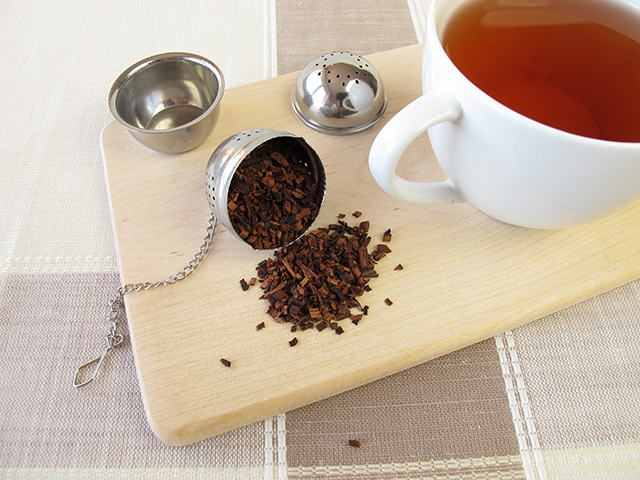Honeybush tea is a nutrient-rich, antioxidant-filled, heart-healthy drink from South Africa
04/01/2019 / By Michelle Simmons

The first thing that comes to mind when people think of tea is the hot beverage made from the leaves of the Camellia sinensis plant. Indeed, this is tea — as well as its variants, green tea, black tea, and oolong tea — but it’s not its only form. For instance, herbal teas — made from dried fruits, flowers, spices, or herbs — have been around for centuries.
One great example of herbal tea is honeybush tea, which is native to South Africa. It is made from both the fermented and non-fluoridated stems and leaves of the honeybush plant (Cyclopia intermedia). This herbal tea is consumed for its health benefits, which include the following.
- It provides nutrients and antioxidants. Drinking a cup of honeybush tea can provide the body with minerals such as calcium, copper, iron, magnesium, manganese, potassium, sodium, and zinc. Honeybush tea is also a great source of antioxidants, including coumestans, flavones, flavonoids, isoflavones, luteolin, phenolics, pinitol, polyphenols, xanthones, and 4-hydroxycinnamic acid, among others.
- It helps fight colds and coughs. Honeybush tea has antibacterial and antiviral properties that help the immune system deal with oxidative stress. These properties not only prevent coughs and colds, but also asthma, bronchitis, coughing, pulmonic tuberculosis, catarrh, and flu. Researchers have also found that pinitol in honeybush works as an expectorant, helping to relieve coughs and boosting immune health.
- It aids in weight loss. Honeybush tea may be helpful to people who are trying to lose weight. The tea has been shown to prevent fat buildup in animal and cellular obesity models, according to a study published in the Phytomedicine. This means that it can prevent the body from storing fat, at the same time, help break down existing body fat. This beneficial effect may be attributed to its polyphenols.
- It fights cancer: Research has shown that honeybush tea effectively treats and prevents cancer. In a study published in the journal Nutrition and Cancer, researchers found that the herbal tea inhibited tumor growth in rats. Moreover, research has also shown that it can prevent certain types of mutagenesis in the liver. (Related: South African, rooibos and honeybush teas shown to fight prostate and breast cancer.)
- It helps manage diabetes: Drinking honeybush tea can also be beneficial to people with diabetes. Its pinitol content is frequently studied for its ability to lower blood sugar. It has also been reported to exhibit insulin-like effects and improve glycemic control in mice – both of which may be effective for diabetes management.
- It improves women’s health: Honeybush tea can help women in many ways, especially during menopause – when depression, mood swings, hot flashes, and osteoporosis often occur. Honeybush tea contains phytoestrogens like isoflavones and coumestans, and can help regulate menstrual cycles.
- It keeps the skin healthy: Studies have shown that honeybush extract prevents sunburns and skin damage caused by ultraviolet B (UV-B) rays. One study in the Journal of Photochemistry and Photobiology has revealed that honeybush protects the skin from inflammation and oxidative damage. Additionally, it relieves sunburn symptoms, such as peeling skin, edema, hardened skin, and reddened skin. Its extract also fights skin aging by improving skin elasticity, hydration, and wrinkles, according to a study published in the Journal of Cosmetic and Laser Therapy.
- It can prevent inflammatory bowel diseases (IBDs). Honeybush tea can fight inflammation and prevent the development of IBDs like Crohn’s disease due to its phenolic compounds. These compounds have the ability to suppress the body’s inflammatory response, which was demonstrated in inflamed intestinal cells like those seen in IBDs. In addition, the flavonoids in honeybush tea help relieve diarrhea, indigestion, and abdominal cramping.
- It supports heart health: Because of its rich antioxidant content, honeybush tea can improve cardiovascular health. It can improve blood pressure and cholesterol levels.
You can find honeybush tea bags in many stores, but you can also make your own tea with loose honeybush tea leaves. Just put a teaspoon of dried honeybush tea leaves in a teacup, then pour hot water over the tea leaves. Let it steep for five to seven minutes, then strain loose leaves from the cup. Honeybush tea is naturally sweet, but you can still add some honey if you want to.
Sources include:
Submit a correction >>
Tagged Under:
antioxidants, Cyclopia intermedia, food cures, food is medicine, functional food, herbal teas, honeybush, honeybush tea, medicinal plants, natural cures, natural healing, natural medicine, natural remedies
This article may contain statements that reflect the opinion of the author






















